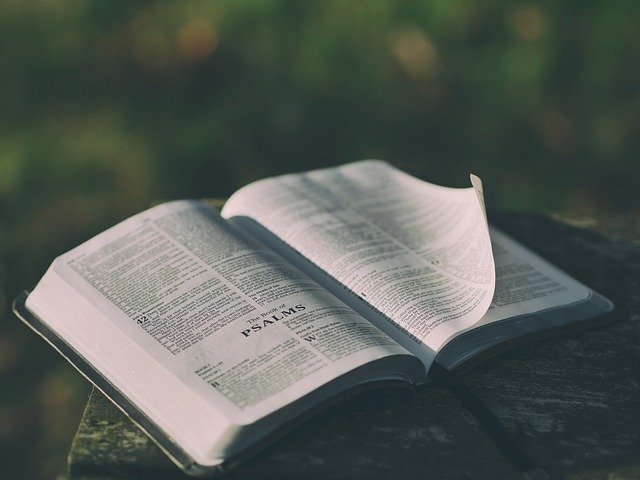Psalm 37 is about feeling like the immoral, the sinners, and the wicked, always seem to reap rewards that they don’t necessarily deserve, in our eyes. It’s about looking deeply at ourselves, and leaving the task of sorting out good from evil to the almighty God. It’s a guide for living and its advice for the faithful to live, without trying to judge others iniquities. We will look at the first 28 verses.

Have you ever looked at someone and wondered to yourself, “why do I work so hard to be a good person and struggle, while this person works so hard to be a terrible person and yet always seems to have everything they could want?” How is it that those who denounce God, or even hate God, seem to prosper with ease, while those that live faithfully and demonstrate their love for God, seem to struggle. Albeit the word “struggle” is a subjective term. There are people around the world that struggle so much more than most of us could imagine.
David writes Psalm 37 as an old man. We know he’s old because he says so in verse 25, “I have been young, and am now old.” David certainly had a life of blessings, as well as punishments by God. Because of his experiences, David also became a very wise man.
Let God Sort it Out
Psalm 37:1-2 David says
1 Do not fret because of those who are evil or be envious of those who do wrong; 2 for like the grass they will soon wither, like green plants they will soon die away.
David compares evil people to grass and green plants. He says that eventually, they wither and die away. Don’t we all?
Psalm 37:3-4 explain why this is different.
3 Trust in the Lord and do good; dwell in the land and enjoy safe pasture. 4 Take delight in the Lord, and he will give you the desires of your heart.
Trust in the Lord and do good? David is telling us to let God handle other people and we should take care of ourselves. He then tells us to “Take delight in the Lord and he will give you desires of the heart.” What does this mean? It means we need to just let our hearts be happy with our faith in God. If we do that, he will give us the desires of our heart. No, it doesn’t mean he will give us the Porsche we’ve been seeing on TV. It means, God will change our heart, and change our desires. If we fill our heart with God, our desires become that of God, and not of the earthly possessions we lust after.
Psalm 37:5-6 seem to reiterate the previous verses.
5 Commit your way to the Lord; trust in him and he will do this: 6 He will make your righteous reward shine like the dawn, your vindication like the noonday sun.
Verse 5 tells us what happens if we “Take delight in the Lord.” If we commit, then we can trust him to give us our desires. Again, not a new car but a new heart. In verse 6, he tells us the result if we take delight in the Lord. Our righteousness will “shine like the dawn,” and our “vindication like the noonday sun.” In other words, if our heart is filled with God, and we are truly happy in the Lord, then it will show to people around us. Not only will people see how happy we are, but the wicked, evil, and immoral people, will see our happiness and we will be vindicated.
Psalm 37:7-8 is our reassurance
7 Be still before the Lord and wait patiently for him; do not fret when people succeed in their ways, when they carry out their wicked schemes. 8 Refrain from anger and turn from wrath; do not fret—it leads only to evil.
Verse 7 tells us to “Be still before the Lord and wait patiently for him.” Is this surprising? I mean, God isn’t on a timetable. He doesn’t answer to our timeclock. Verse 7 also tells us to “not fret when people succeed in their ways.” It also says to not fret “when they carry out their wicked schemes.” To fret means to worry. David’s advice here is to not worry about how other people succeed, when they do so by working their wicked ways.
Verse 8 says to “refrain from anger and turn from wrath” and “do not fret—it leads only to evil.” He’s telling us to turn away from anger, and to not seek to worry. Because worrying only leads to evil. It accomplishes nothing, except to harm our own self. Jesus tells us in Mathew 6:34 “Therefore do not worry about tomorrow, for tomorrow will worry about itself. Each day has enough trouble of its own.”
Psalm 37:9 is a warning to us.
It warns of what happens if we ignore verse 8, and what we can expect if we heed it.
9 For those who are evil will be destroyed,
but those who hope in the Lord will inherit the land.
Psalm 37:10-11 Explain the result of being patient with God. (See verse 7)
10 A little while, and the wicked will be no more; though you look for them, they will not be found. 11 But the meek will inherit the land and enjoy peace and prosperity.
Verse 10 tells us to wait a while. In other words, “It might take a while, but eventually, the wicked will be no more. Verse 11 tells us that those who are patient and those who are meek, will inherit the land and enjoy [peace and prosperity. “The meek will inherit the land.” Sound familiar? It should if you’ve read Jesus’ sermon on the Mount.
Psalm 37:12-15 give us a look act vs reaction.
It’s between the wicked and their punishment from God.
12 The wicked plot against the righteous and gnash their teeth at them; 13 but the Lord laughs at the wicked, for he knows their day is coming. 14 The wicked draw the sword and bend the bow to bring down the poor and needy, to slay those whose ways are upright. 15 But their swords will pierce their own hearts, and their bows will be broken.
Notice that each verse depicts and act by the wicked, followed up by the reaction of God. Of course, in modern times, this doesn’t necessarily mean the wicked will be drawing a sword. Nor does it mean that God will pierce their hearts with a sword. What David is saying here, is that while the wicked may plot, and they may work their evil deeds to take down the righteous, God will be the ultimate server of justice. Whether here on earth, or thereafter, God will win the battle. Verse 13 even states that God, whom we know is patient, knows their day is coming.
Psalm 37:16-19 are words of Hope
16 Better the little that the righteous have
than the wealth of many wicked;
17 for the power of the wicked will be broken,
but the Lord upholds the righteous.
18 The blameless spend their days under the Lord’s care,
and their inheritance will endure forever.
19 In times of disaster they will not wither;
in days of famine they will enjoy plenty.
Starting with verse 16, we see that its better to have little and be righteous, than to have a lot and be wicked. The reason is resolved in verse 17. “The power of the wicked will be broken, but the Lord upholds the righteous.” In other words, what good is having wealth and being wicked, if it doesn’t get you into heaven. Earthly life is temporary, and heaven is eternal. You can’t take your possessions to heaven. If possessions make you wicked, then they’re preventing you from eternal life, thus making your wealth only temporary. Whereas the righteous live on forever, with the delight of the Lord in their hearts.
Psalm 37:20-22 are words of warning for the wicked
20 But the wicked will perish:
Though the Lord’s enemies are like the flowers of the field,
they will be consumed, they will go up in smoke.
21 The wicked borrow and do not repay,
but the righteous give generously;
22 those the Lord blesses will inherit the land,
but those he curses will be destroyed.
David personifies flowers in a field and compares them to the wicked. They can wilt, they can wither, and they will go up in smoke. In verse 21, David describes the wicked as those who borrow but do not pay, while the righteous give generously. He’s saying, the wicked are “takers.” They take everything and give nothing. They suck life from the land, and give nothing back. IN response, they will be cursed and the blessed will inherit the land.
Psalm 37:23-24 gives us insight into the help we receive from God.
23 The Lord makes firm the steps
of the one who delights in him;
24 though he may stumble, he will not fall,
for the Lord upholds him with his hand.
Verse 23 gives us strength. It tells us how God holds the hands of those who delight in him and gives them strength. It reassures us, that while we may stumble, we will not fall. In other words, God is our crutch. He is our solid footing, and our sturdy force to help hold us upright.
Psalm 37:25-28 is a witness of Gods reward, from David
25 I was young and now I am old,
yet I have never seen the righteous forsaken
or their children begging bread.
26 They are always generous and lend freely;
their children will be a blessing.
27 Turn from evil and do good;
then you will dwell in the land forever.
28 For the Lord loves the just
and will not forsake his faithful ones.
Wrongdoers will be completely destroyed;
the offspring of the wicked will perish.
David explains, that in his many years, he has never seen the righteous be forsaken or their children begging for bread. He’s speaking of history. He’s talking about righteous people from history, and how righteousness can benefit the descendants of the righteous, (Their children). The story of Noah is an example of this. Because of his righteousness, his family was spared. He describes the kindness of the righteous, that they were always generous and always lend freely. Verse 27-28 are a plea and a reward. Turn away from evil, do good, and you will dwell in the land forever. Turn from evil, be good, and live eternally. Isn’t that the promise we all seek? Eternal life. Isn’t that the reward we all seek? Verse 28 says, the Lord loves the just and will not forsake the faithful.
